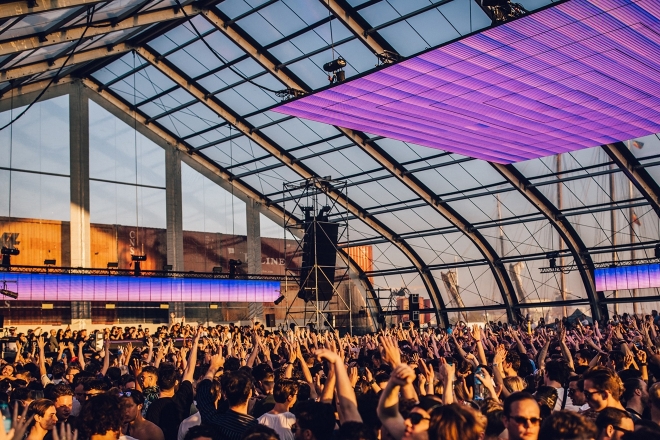DGTL Festival announces that it will only use sustainable aviation fuel for all artist travel
Through a groundbreaking partnership with SkyNRG, the Dutch festival completes the circular festival experience & creates a blueprint for large events

Dutch festival brand DGTL has opened the door to sustainable air travel across the music industry after it announced last week a partnership with sustainable fuel pioneer SkyNRG that will see that all artists travelling by air to its eight international events reduce their CO2 emissions by using replacing fossil fuels with sustainable aviation fuel (SAF).
Although the festival encourages artists to use alternatives to air travel where possible, avoiding flights altogether is not a viable option for the music industry — but via this partnership, it looks to make zero alternatives for unavoidable flights the norm.
SAF has been around since 2011 and has powered more than 300,000 flights but still only accounts for about 1% of commercial air travel. Instead of using fuel that has been refined from petroleum, like fossil-based aviation fuel, SAF is produced from sustainable resources like biogenic feedstocks such as waste cooking oil, agricultural residues and municipal waste, and can significantly reduce CO2 emissions when compared to fossil fuel depending on the technology and feedstock used.
How it works is via a system called book and claim, which allocates the fuel produced in a SkyNRG facility to a nearby airport rather than on the actual planes artists use to fly — similar to offsetting, or the purchase of carbon credits, if you must. The carbon-neutral air option is also favoured by companies like DHL, United Airlines and some private jet travel companies.
DGTL has long been committed to making its events as environmentally conscious and sustainable as possible, saying that they already have a “firm handle” on energy, water and sanitation, food and commodities at its Amsterdam event, which is run entirely on renewable energy, offers a 100% plant-based menu in the food court, has reduced residual waste per visitor from 2.3kg to 0kg and even set up a circular sanitation group, which extracts nutrients from urine and faeces for use as soil improvers and fertilisers (from pee to tea). This latest move in tackling the problem of mobility is what the organizers call the final piece in its “overall sustainability puzzle”.
The news also marks the first time that an event of this capacity will run entirely on fossil fuel alternatives in Europe, setting a new precedent for sustainability in the music industry while creating a blueprint for large events to follow suit.
“We feel a responsibility to continuously improve and maintain our social and environmental impact on the globe and we are committed to leaving the world a bit better than we found it,” says DGTL’s sustainability coordinator Mitchell van Dooijeweerd.
“That’s why we are always researching and implementing innovative measures to progressively reduce emissions. But we’re looking beyond our own emissions too. Through this partnership with SkyNRG, we reduce CO2 emissions together with our artists and ensure that what we do inspires our surroundings."
“Replacing fossil kerosine with SAF is a huge step forward for unavoidable flights. Furthermore, it is a scalable solution that can reduce air travel emissions for other events too where air travel may be unavoidable. DGTL’s festivals have a huge reach, which is why it is important we lead by example and plant the seed for change.”
The festival will also soon launch a carbon emissions calculator together with climate tech builder Chooose that's aimed at helping both the music industry and the general public evaluate and reduce their CO2 footprint.
As of writing, DGTL’s flagship event is currently scheduled for September 11 - 12, 2021, and then again alongside ADE on October 14- 16. The brand also has editions in Barcelona, Madrid, São Paulo, Bangalore, Tel Aviv and Santiago, although only the latter two currently has a date set for 2021. The ADE event is currently a go and will be spread out over four events and three days with headlining sets from Disclosure, The Blessed Madonna, Kölsch, KiNK Live, Sven Väth, Dixon, Paula Temple, Honey Dijon, Jon Hopkins, Dax J as well as a sloew of really amazing local Dutch talent.
Earlier this year, a Berlin-based collective called Clean Scene has published an eye-opening report on the impact of flights by touring DJs. Titled Last Night a DJ Took a Flight: Exploring the carbon footprint of touring DJs and looking towards alternative futures within the dance music industry, the report was born out of a need to understand the impact our industry has on the planet and examines artists on Resident Advisor's top 1000 DJs list by factoring in how many flights they took in 2019.
Omitting 2020 for obvious reasons, the report found that in 2019 artists took more than 51,000 flights and travelled more than 117,000,000 kilometres, using 3,200,000 litres of fuels and emitting 35,000,000 tons of CO2 into the air. To give you some context, this is equivalent to the amount of electricity it takes to power 20,000 households for one year, powering 8,000 festivals for three days or pressing 25 million records.
Mixmag Asia is committed to providing coverage to those looking to lessen the impact of the music industry on our planet. Read more sustainability content from Mixmag Asia’s Green Room series here


